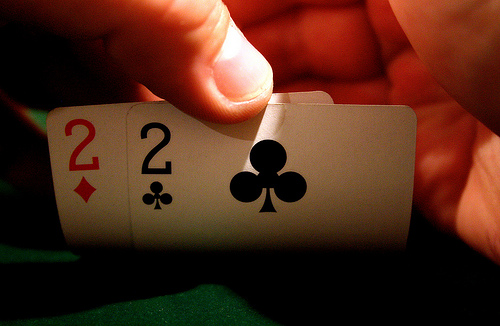Poker is purely a game of luck and anyone playing it is just rolling the dice. Have you heard something like this before? By the time you finish reading this, you will have the tools you need to make a profit against beginning players every time you sit at the poker table.
While there are many variations to the game (Omaha, Texas Hold-Em, 5 Card Stud just to name a few), the basic principle of poker remains the same throughout – whoever has the highest hand wins. While the cards you get dealt may depend on luck, how you play (or don’t play) them is completely up to you. Following are three tips to ensure that you will be nearly unstoppable against beginning poker players.
1) Size up your opponents
At the beginning stages try to learn how your opponents are likely to play. Most rookies will adopt a strategy and stick to it, regardless how well it works for them. Does your opponent bet high on bluffs often? Does your opponent fold every time? Knowing how your opponent plays is key to getting them to play against themselves.
If your opponent is a bluffer, wait until you have a winning hand and limp in. As your opponent calls, coax him (or her) into making a bluff raise, whereby you can either call or re-raise, all but letting your opponent know they’ve been defeated. Someone who plays more conservatively will eventually find their chips decreasing due to paying the blinds – force them to pay to play. Don’t let a person who rarely bets just limp in. If that person is the big blind, raise the opening bet – beginners are often afraid to spend more money to see the flop.
2) Change your style as fits the game
Don’t get too comfortable playing one way – be flexible. As mentioned above, rookies tend to adopt a style and not change. There are times to bluff with a deuce and a seven and there are times to fold pocket aces. It is up to you to watch how the table has been going and how your opponents have been playing.
Many beginners may see a re-raise on a bluff raise and be tempted to fold. Depending on your opponent, you may just be able to re-raise again and get them to fold. On the other hand, if your opponent doesn’t bet on a bluff and you have the bluff, folding may be your best bet that round.
3) Don’t bluff too often.
This should be a no-brainer. Bluffing is a tactic to get people to fold. Obviously if you are bluffing, you don’t hold a winning hand. Even rookies will soon figure out to call your bluffs if that’s all you do. Make sure that you win some hands outright via slow play, aggression, etc. Be unpredictable.
So, there you have it – three tips to whip beginning poker players. If you see your opponents dropping off the tables like flies, don’t feel bad. You aren’t there to help them. You’re there to take their money.
